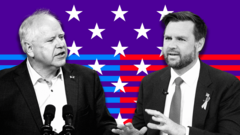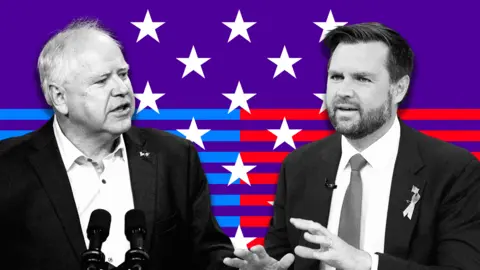This website uses cookies so that we can provide you with the best user experience possible. Cookie information is stored in your browser and performs functions such as recognising you when you return to our website and helping our team to understand which sections of the website you find most interesting and useful.

 BBC
BBCDemocrat Tim Walz and Republican JD Vance will meet for their one and only vice-presidential debate on Tuesday night in New York City.
While the stakes in these kind of running-mate face-offs are typically low – an undercard to the presidential main event - this one might be different.
In a tight race that could be decided by tens of thousands of votes in a handful of states, every opportunity to generate positive attention and political momentum is precious.
At the very least, the debate will be a fascinating contrast between two men with very different styles and political beliefs and two campaigns with distinct strategies for winning the White House.
Donald Trump announced his selection of Vance back in July, at the start of the Republican National Convention and just a day after his near-assassination.
The former president was riding high in the polls, and his pick of the 40-year-old Ohio senator was viewed not only as a play to the white working class in the industrial Midwest – a key demographic in a region that is a top electoral battleground – but also as a way to establish his political legacy.
Unlike Trump’s first vice-president, Mike Pence, Vance is an ideological kindred spirit, whose focus on trade and immigration match Trump’s top political priorities.
If Vance was a front-runner to be Trump’s running-mate, Walz’s path to the Democratic number-two spot was considerably more unlikely. After Joe Biden abandoned his re-election bid, Vice-President Kamala Harris stepped in as the standard bearer and shortly thereafter began her ticket-mate search.
Walz, the governor of Minnesota, was not a leading contender for the job, but his viral appearances on television, deriding Republicans as “weird”, and his ability to defend liberal policies in moderate-friendly language won Harris over.
Vance sells Trump’s message to disaffected America
On the campaign trail, both men have sought to put the political skills that earned them the running-mate jobs to work.
Vance is polished and practised – a former Silicon Valley venture capitalist with an Ivy League pedigree that belies his rural Appalachian roots. Walz is a high-school teacher turned politician with a penchant for folksy Midwestern humour.
Vance has been a frequent advocate for the Trump campaign on mainstream media news programmes. He’s also rallied potential supporters in rural areas of the Midwestern battleground states, part of the Trump campaign’s strategy of engaging sympathetic voters who may not have participated in previous elections.
Last week in Traverse City, Michigan, Vance gave his standard stump speech, which is focused on immigration, the economy and trade.
“We’re going to pursue some commonsense tax and economic policies,” he told the crowd of a few thousand cheering supporters gathered in a local fair ground. “We will do it with American workers rather than foreign slave labourers.”
While many of the rally attendees didn’t know much about Vance prior to his selection as candidate for vice-president, they said they liked what they had heard so far - even as Vance has frequently flirted with controversy. His amplification of untrue rumours that Haitian migrants were stealing and eating pets in Ohio is a recent example.
Walz appeals to voters Harris struggles to reach
The Democrat has been a regular fixture in more rural areas of the battleground states - often appearing in places that are traditionally more conservative. As a former high school football coach, he’s sought to play up his background and links to America’s most popular sport. On Saturday, he was at the Michigan-Minnesota college football game which was played in front of a crowd of 110,000.
When Harris introduced Walz as her vice-presidential pick at a Philadelphia rally in early August, she repeatedly referred to him as “Coach Walz” - and highlighted his high-school teacherbackground.
The Democrats may be hoping his plainspoken, salt-of-the-earth appeal could cut into the Republican margins outside major metropolitan areas.
“In Minnesota, we respect our neighbours and their personal choices that they make," Walz said in Philadelphia. “Even if we wouldn’t make the same choice for ourselves, there’s a golden rule: Mind your own damn business.”
How will the candidates attack each other?
During Tuesday night’s debate, Vance is likely to continue to hammer Democrats on the economy, immigration and crime – areas where polls show Trump and the Republicans are favoured.
He could accuse Walz of being slow to react to the sometimes violent demonstrations in Minnesota following the death of George Floyd at the hands of Minneapolis police and highlight some of the more controversial liberal policies Walz enacted as governor, including around transgender rights.
He may also point to Walz’s sometimes contradictory statements about his record serving in the Minnesota National Guard.
Walz may counter by highlighting Vance’s past controversial statements – on Ohio Haitians and his derisive remarks about Democratic women who don’t have children being “childless cat ladies”.
He may also note Vance’s connections to people who oversaw Project 2025, the proposed governing agenda advanced by the Heritage Foundation, a conservative think tank. He is also sure to shift the focus onto the social issues where Democrats are stronger – such as healthcare, the environment and, most prominently, abortion rights.

More on the US election
The men who would be a heartbeat from the presidency
Both men had relatively low profiles in national politics prior to their elevation to their respective presidential tickets. Vance, who has served less than two years in the US Senate, is best known for best-selling memoir, Hillbilly Elegy. Walz has a longer political record, serving as governor and as a congressman from a rural area of Minnesota, but he was never in the top ranks of party leadership.
The two will have the opportunity to introduce themselves to millions of Americans for the first time on Tuesday night – and their performance could reflect on the judgement and decision-making skill of the presidential nominees who selected them.
The spotlight on Vance may be particularly sharp, given that Trump, if he wins, will be the oldest person ever elected president. Vance could also take the opportunity to provide ideological depth and detail to Trump’s conservative populism, as he did during his July Republican convention speech.
For Walz, it’s a chance not only to help Americans learn more about him as a candidate, but about a Democratic ticket that did not exist two months ago – one that, according to polls, many Americans still are uncertain of. If he can do that in a way that appeals to moderate and independent voters – his touted strength – all the better for the Harris camp.
Typically, the vice-presidential debate happens in the midst of a series of presidential debates – an interlude between the candidate showdowns that really matter.
With no further presidential debates scheduled this year, however, the running-mate face-off could be the last chance for American voters to see the two tickets represented in direct contrast before they cast their ballots.




 Africana55 Radio
Africana55 Radio 

